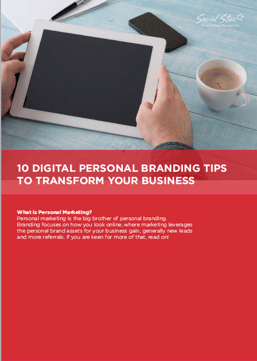-1.jpg?width=414&name=Untitled%20design%20(16)-1.jpg)
Doing paid marketing, such as Google Adwords or Facebook ads, are not as effective as a referral. However, there is room for both in an effective marketing strategy for your small business so let’s review why referrals are better than paid marketing and how to use paid-marketing to make your brand more e-ttractive.
Why are referrals better than paid-marketing?
Most small businesses rely on referrals for their new business. If you do a good job you will get clients recommending you to others, and these referrals are the best marketing you can ever get. They convert from an inquiry at between 50-80% and cost nothing! However, the way referrals work has massively changed over the last few years and those that haven't caught onto this change are at risk of being overtaken by their competitors.
This was highlighted to me recently when I had a call from a potential new client. Let’s call this new potential client “James”. James has been running his family physio business and been losing business to competitors steadily over the last few years. In fact, it was so bad, James was considering retiring after 25 years in the same location. When I looked “James’s business” up on Google, I saw many competitors within 1km of their location, some of which were my current clients, but I couldn't find James. It turns out James didn't have a website, social media or any digital presence! Wow. So even with a great reputation, 25 years’ experience in the same area and a shop front, James couldn't get enough new clients. James was losing business to competitors who had a stronger digital presence.
This makes sense for some of us, as it's an extreme example having no digital at all. Most small business will have a website and at least a Facebook page. The first step for James to fix his business is build his digital presence and then stimulate his referrals. But while he is doing this and waiting for it to take effect, digital advertising can fill the gap in his marketing.
Paid marketing mistakes
After working in digital marketing for 15 years I have seen some massive waste of money from companies, big and small, in paid marketing. One crazy very large IT company used to spend all its Google search engine marketing (SEM) budget on buying ads for their product names. Every code number and product - there were hundreds. The issue with this strategy is they were already getting the organic SEO link right under the ad. Therefore, the person searching was getting the paid link and the organic link, and if they click the paid link it costs the company money which they could have been getting for free.
Therefore, the first lesson is not to spend money on links you would get for free. Focus instead on what “term” or “type of information” your prospect would search for before they know your name or product. For instance, don’t purchase ads with your company name in the search words, as if people are searching on your company name, you would already get that organically. Test your product names to see if you get the organic link and if you do, there is no need to advertise against this search.
The better strategy is to choose one category for your product and own that with organic SEO. That means your website and social media is optimised for this search. Write blogs, make videos, create images and useful content around this one area and you will get a presence on Google. Then use paid advertising to market your other products.
We hope you have enjoyed these 10 tips to build a more e-ttractive online brand.
P.S. You can download our "10 Personal Branding Tips" ebook here.

Posted by Andrew Ford
Marketing expert, speaker and published author, Andrew Ford is the Founder and lead Personal Branding Consultant at Social Star
Facebook LinkedIn Twitter Google+
